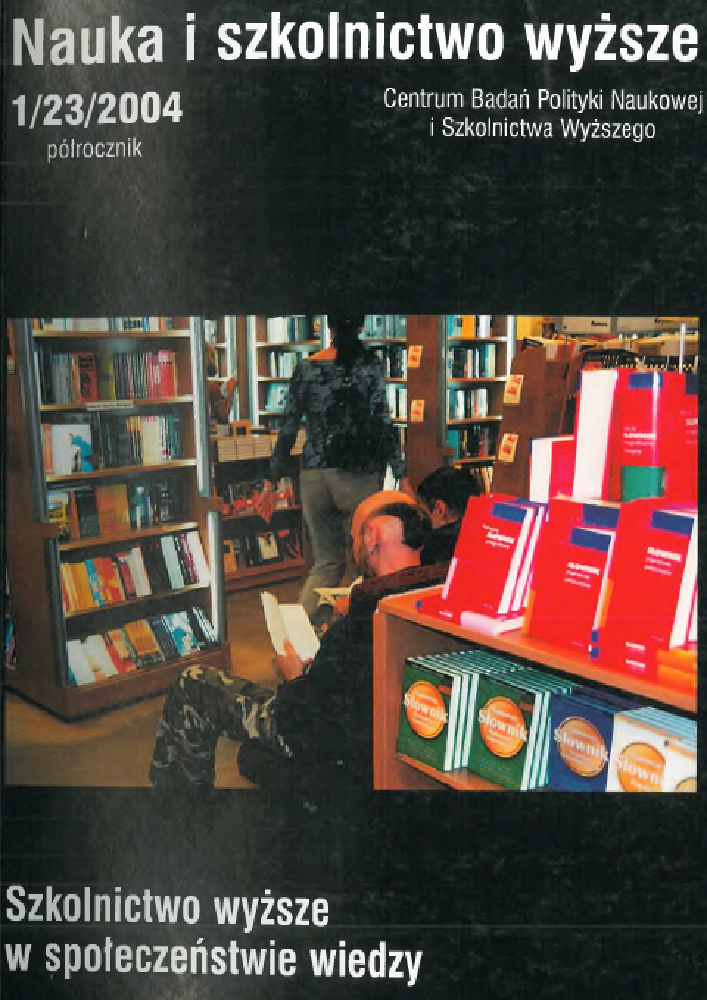Abstract
The author attempts at identifying the students’ expectations associated with vocational degree courses and how those expectations are fulfilled. According to the current law, vocational studies cover engineering studies and bachelor’s degree courses. The students at those courses make up 43% of all university students in Poland. The question about the type of education offered within the so-called short degree programmes refers to a phenomenon which represents a considerable share of Poland’s higher education as a whole. The discussion is based on empirical studies conducted in 2000-2002. The author uses official rhetoric of applicable legislation and common knowledge as points of reference for her interpretation. This approach seems particularly justified with regard to bachelor’s degree [licencjat], a new quality in the Polish higher education system and on the job market. The law unifies bachelor’s degree courses and gives them a vocational status, i.e. describes them as industry-oriented, offering a considerable portion of specialised knowledge, practical training as an essential element of education and a shorter (3-4 years) period of study (vs. master’s degree courses). In public perception, government-funded academic institutions carry bachelor’s degree holders to the level which corresponds to the first level of general university studies, i.e. prepares them for further education rather than a specific occupation. In contrast, bachelor’s degree courses in other types of higher education establishments have a vocational focus. Research results have not fully confirmed that this aggregate approach would be justified, yet they provide a picture which is closer to common knowledge.
References
Białecki I., Sikorska J. (red.) 1998Wykształcenie i rynek, Wydawnictwo TEPiS, Warszawa.
Bennet N., Dunne E., Carre C. 1999 Patterns of Core and Generic Skill Provision in Higher Education, „Higher Education”, nr 37.
Bourdieu R, Passeron J.C. 1990 Reprodukcja. Elementy teorii systemu nauczania, Państwowe Wydawnictwo Naukowe, Warszawa.
Dearlove J. 1998 FundamentaI Changes in Institutional Structures: The United Kingdom, Higher Education Policy”, vol. 11, nr 2/3.
Drogosz-Zabłocka E. 2002 Opinie pracodawców na temat przygotowania do pracy absolwentów studiów zawodowych, w: E. Drogosz-Zabłocka, B. Minkiewicz, R. Nowakowska-Siuta: Licencjat w uczelni i na rynku pracy, Uniwersytet Warszawski, Centrum Badań Polityki Naukowej i Szkolnictwa Wyższego, Warszawa.
Goćkowski J., Machowska K.M. 2004 Wiedza i informacja w nowoczesnym społeczeństwie - przyczynek do dyskusji o społeczeństwie wiedzy, „Nauka i Szkolnictwo Wyższe”, nr 2/22.
Goedegebuure L.C.J., Meek V.L. 1998 Różnorodność i zmiana: polityka rządowa a wpływ otoczenia, „Nauka i Szkolnictwo Wyższe”, nr 12.
Green A. 1997 University of London, Institute of Education, Convergences and Divergences in European Policy: An International Comparative Perspective. Internal Report, a Research project commissioned by the European Commission, Directorate-General XXII Education, Training and Youth, Institute of Education, London.
Harvey L., Moon S., Geall V. 1997 The Graduates Work: Organisational Change and Students Attributes, Centre for Research into Quality, University of Central England Birmingham.
Lewin H.M. 1980 Workplace Democracy and Educational Planning. Education, Work and Employment - II, UNESCO, Paris.
Neave G. 1983 The Dynamics of Integration in Non-integrated Systems of Higher Education in Europę, w: H. Hermanns i in.: The Compleat University, Schenkman, Cambridge.
Pratt J. 1992 Unification of Higher Education in the United Kingdom, „European Journal of Education”, vol. 27, nr 1-2.
Teichler U. 1999 Higher Education Policy and the World of Work: Changing Conditions and Challenges, „Higher Education Policy”, nr 12.
Trow M. 1974 Problems in the Transition from Elite to Mass Higher Education, w: Policies for Higher Education, OECD, Paris.
Two Decades... 2000 Two Decades of Reform in Higher Education in Europe: 1980 Onwards (2000), Eurydice Studies, European Commission, Brussels.
Van der Wende M.C., Westerheijden D.F. 2002 Międzynarodowe aspekty jakości kształcenia - ze szczególnym uwzględnieniem szkolnictwa wyższego w Europie, „Nauka i Szkolnictwo Wyższe”, nr 2/20.
Wójcicka M. 1999 Oczekiwania studentów wobec studiów i wybranego kierunku. Komunikat z badań, „Nauka i Szkolnictwo Wyższe”, nr 14.
Wójcicka M. 2001 a Czynniki decydujące o wyborze zawodu (kierunku studiów), w: B. Minkiewicz, T. Szapiro (red.): Biogramy edukacyjne, Szkoła Główna Handlowa, Ośrodek Rozwoju Studiów Ekonomicznych, Warszawa.
Wójcicka M. 2001 b Dywersyfikacja w szkolnictwie wyższym, „Nauka i Szkolnictwo Wyższe”, nr 2/18.
Wójcicka M. 2002a Studia zawodowe w Polsce. Problemy i perspektywy, Uniwersytet Warszawski, Centrum Badań Polityki Naukowej i Szkolnictwa Wyższego, Warszawa.
Wójcicka M. 2002b Szkolnictwo wyższe w Wielkiej Brytanii, w: M. Wójcicka (red.): Dywersyfikacja w szkolnictwie wyższym. Uwarunkowania i perspektywy, Uniwersytet Warszawski, Centrum Badań Polityki Naukowej i Szkolnictwa Wyższego, Warszawa.
